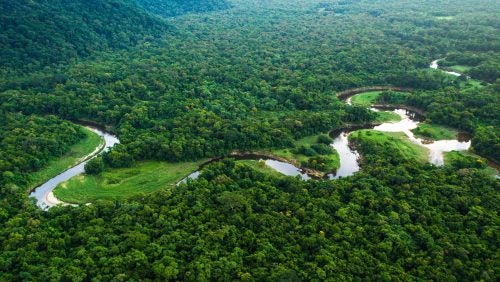Are We Out of the Woods? What Brazil’s Elections Could Mean for Climate Change
November 9, 2022 by Katya Simon

Aerial image overlooking a winding river in the Amazon Rainforest. Source: https://media.cntraveller.com/photos/611becca628f4910ed10222d/16:9/w_2992,h_1683,c_limit/gettyimages-1044285108.jpg
For decades, the Amazon rainforest has been an important natural resource in the fight against climate change due to its ability to absorb high levels of carbon dioxide from the air and act as a “carbon sink” for emissions from human activities.[1] However, over the past several years scientific studies have shown that deforestation in the Amazon—driven in large part by expansion of the agricultural industry—has turned the Amazon from a carbon sink into a net source of carbon emissions.[2] Researchers warn that the rainforest is nearing a critical threshold, beyond which it will start to be replaced by grassland, with enormous consequences for biodiversity and global climate change.[3] But all is not lost; a tipping point is not inevitable, researchers say, if human activities like clear-cutting and controlled burns are stopped and the forest is allowed to recover.[4]
This is why climate activists have been paying extremely close attention to Brazil’s 2022 presidential elections. On October 2, current President Jair Bolsonaro, who has a track record of policies encouraging deforestation, faced off against former President Luiz Ignacio Lula da Silva (Lula), under whose leadership deforestation was reduced to near-record lows.[5] Bolsonaro is an advocate for commercial farming and mining in the Amazon, and after he took office in 2019, the rate of deforestation in Brazil accelerated rapidly.[6] Bolsonaro also weakened Brazil’s environmental enforcement agencies by cutting their budgets and staff, which made it harder to punish violations of environmental law like illegal logging and ranching.[7] These are the types of human activities that climate researchers have warned need to be halted in order to preserve the rainforest, and another four years of the same economic and environmental policies in Brazil would likely bring the Amazon further toward a tipping point.
What about Lula? His past record on conservation is much better: between 2003 and 2010 when he was in office, environmental enforcement agencies were strengthened, and deforestation fell by seventy-two percent.[8] While campaigning for the 2022 elections, he publicly committed to zero deforestation and principles of climate justice, and has won the support of indigenous groups who have suffered violence and loss of land from illegal loggers and landgrabbers, as well as climate advocates.[9] On October 30, Lula achieved a narrow win over Bolsonaro to become Brazil’s next president.[10]
So, are we in the clear yet? It might be too soon to tell. During Lula’s previous term, the Brazilian economy was benefiting from a commodity boom that raised the value of exports and allowed the government to fund social programs and combat poverty without opening up the Amazon to industry.[11] The current situation is markedly different, with high inflation and a more challenging global economic environment. Additionally, many seats in Brazil’s Congress are filled with pro-agribusiness lawmakers, which will make Lula’s efforts to roll back industrial development policies more challenging.[12] But Lula’s election has given climate advocates, in Brazil and around the world, hope that the degradation in the Amazon will slow and the rainforest will have a chance to begin recovering.
[1] Sharon Pruitt-Young, Parts Of The Amazon Rainforest Are Now Releasing More Carbon Than They Absorb, NPR (Jul. 15, 2021), https://www.npr.org/2021/07/15/1016469317/parts-of-the-amazon-rainforest-are-now-releasing-more-carbon-than-they-absorb.
[2] Id.
[3] Henry Fountain, Amazon is Less Able to Recover from Droughts and Logging, Study Finds, N.Y. Times (Mar. 7, 2022), https://www.nytimes.com/2022/03/07/climate/amazon-rainforest-climate-change-deforestation.html.
[4] Id.
[5] Jake Spring, Explainer: What Brazil’s Election Means for the Amazon Rainforest, Reuters (Oct. 26, 2022), https://www.reuters.com/world/americas/what-brazils-election-means-amazon-rainforest-2022-10-26/.
[6] Id.
[7] Id.
[8] Id.
[9] Id.
[10] Zahra Hirji & Akshat Rathi, Brazil’s New President Gives the Amazon a Fighting Chance, Bloomberg (Nov. 1, 2022), https://www.bloomberg.com/news/articles/2022-11-01/brazil-s-new-president-gives-the-amazon-a-fighting-chance.
[11] Id.
[12] See Id.

